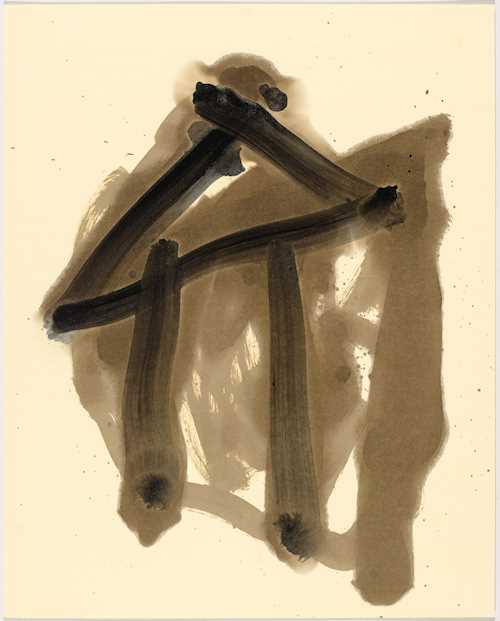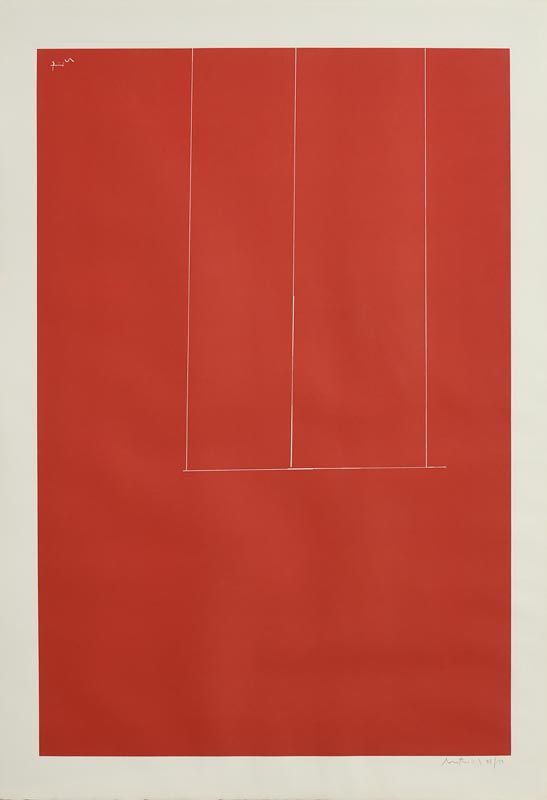ROBERT MOTHERWELL (1915-1991)Untitled (Elegy) circa 1962 oil on canvas board 19 3/4 by 29 3/4 in. 50.2 by 75.6 cm. This work was executed circa 1962. FootnotesProvenance Collection of the artist, New York The Dedalus Foundation, New York Knoedler & Company, New York Acquired directly from the above by the present owner in 2000 Literature Jack Flam, Katy Rogers, Tim Clifford, Eds., Robert Motherwell Paintings and Collages: A Catalogue Raisonné, 1941–1991; Volume Two, New Haven and London 2012, p. 151, n. P233, illustrated in colour As the curtain fell on late Modernism at the end of the 1960s, amid the vast dispersion of styles and media that proliferated in the post-war period, distilled from the multitudes were a handful of grand masters whose legacies have remained, and will remain, largely unrivalled. Their painterly syntax answered a clarion call set before a generation of artists by the definitive critics of Modernism, who firmly planted the flag of the avant-garde on American soil, in New York no less. Their works adorn the halls of all major international museums, the jewels in the crown of any great private collection. Into this group of founders and principal exponents of Abstract Expressionism we would include Jackson Pollock Barnett Newman Mark Rothko Helen Frankenthaler Clyfford Still and of course Robert Motherwell These are artists who define the canon, and whose painterly styles are the very picture of the heights of twentieth century painting. Between Pollock's drips and Frankenthaler's soak-stain, each artist's interpretation of the plastic problems of painting were powerfully unique, and perhaps none more so that the unwavering calligraphic flourishes of black paint that distinguish Motherwell's Elegy to the Spanish Republic series that he produced between 1948 and 1967. Poetic and unwavering, Untitled (Elegy) is a muscular example of Motherwell's definitive series. Executed circa 1962 with a concision that is dramatically rendered in black paint over a crisp white canvas, the visual syllables are instantly recognisable as the mark of Motherwell's Elegies. Untitled (Elegy) bespeaks a poetics beyond language, one that hangs between the instantaneous action of the artist – powerfully washing his laden brush across the surface in a sequence of motions – and the trace of the spectator's eye, observing the painting's staccato chorus, where the notes are suspended, looped, or abruptly curtailed. In the Elegies, Motherwell achieved an approach to painting that, by their very nature, grappled with ideas of seriality and repetition, the relationship between the paint and its support, and the implementation of positive and negative space as pure form. It is plain to see the conviction of his hand in the present work and appreciate the impact of his novel style as it emerged at the end of the 1940s. Motherwell's painting was unabashedly literal, presenting the most elemental vision of oil paint on canvas that jostled with Pollock for the brazen simplicity of its character. Nonetheless, it would be a folly to read Motherwell's Elegies as a question of pure formality. Instead, their radical directness served as a foil for a much greater project, 'a sense of overall meaning,' he contemplated to David Sylvester in 1962, the year of the present work: 'that one's existence in some way makes sense, even if one doesn't know exactly all the connections. I mean, that's the act of faith. That one's being is meaningful. [...] Each particular work for me is a specific moment or a specific embodiment of a large, overall enterprise' (the artist in: 'Painting as Existence: An Interview with David Sylvester ' in The Writings of Robert Motherwell Dore Ashton, Ed., Berkeley 2007, p. 208). Motherwell was an artist who strove to transcend his medium. His Elegies are his greatest success; in the vein of Goya and Albert Camus, his artistic trials politicised and philosophised the personal. The act of painting transformed into an elegy
ROBERT MOTHERWELL (1915-1991)Untitled (Elegy) circa 1962 oil on canvas board 19 3/4 by 29 3/4 in. 50.2 by 75.6 cm. This work was executed circa 1962. FootnotesProvenance Collection of the artist, New York The Dedalus Foundation, New York Knoedler & Company, New York Acquired directly from the above by the present owner in 2000 Literature Jack Flam, Katy Rogers, Tim Clifford, Eds., Robert Motherwell Paintings and Collages: A Catalogue Raisonné, 1941–1991; Volume Two, New Haven and London 2012, p. 151, n. P233, illustrated in colour As the curtain fell on late Modernism at the end of the 1960s, amid the vast dispersion of styles and media that proliferated in the post-war period, distilled from the multitudes were a handful of grand masters whose legacies have remained, and will remain, largely unrivalled. Their painterly syntax answered a clarion call set before a generation of artists by the definitive critics of Modernism, who firmly planted the flag of the avant-garde on American soil, in New York no less. Their works adorn the halls of all major international museums, the jewels in the crown of any great private collection. Into this group of founders and principal exponents of Abstract Expressionism we would include Jackson Pollock Barnett Newman Mark Rothko Helen Frankenthaler Clyfford Still and of course Robert Motherwell These are artists who define the canon, and whose painterly styles are the very picture of the heights of twentieth century painting. Between Pollock's drips and Frankenthaler's soak-stain, each artist's interpretation of the plastic problems of painting were powerfully unique, and perhaps none more so that the unwavering calligraphic flourishes of black paint that distinguish Motherwell's Elegy to the Spanish Republic series that he produced between 1948 and 1967. Poetic and unwavering, Untitled (Elegy) is a muscular example of Motherwell's definitive series. Executed circa 1962 with a concision that is dramatically rendered in black paint over a crisp white canvas, the visual syllables are instantly recognisable as the mark of Motherwell's Elegies. Untitled (Elegy) bespeaks a poetics beyond language, one that hangs between the instantaneous action of the artist – powerfully washing his laden brush across the surface in a sequence of motions – and the trace of the spectator's eye, observing the painting's staccato chorus, where the notes are suspended, looped, or abruptly curtailed. In the Elegies, Motherwell achieved an approach to painting that, by their very nature, grappled with ideas of seriality and repetition, the relationship between the paint and its support, and the implementation of positive and negative space as pure form. It is plain to see the conviction of his hand in the present work and appreciate the impact of his novel style as it emerged at the end of the 1940s. Motherwell's painting was unabashedly literal, presenting the most elemental vision of oil paint on canvas that jostled with Pollock for the brazen simplicity of its character. Nonetheless, it would be a folly to read Motherwell's Elegies as a question of pure formality. Instead, their radical directness served as a foil for a much greater project, 'a sense of overall meaning,' he contemplated to David Sylvester in 1962, the year of the present work: 'that one's existence in some way makes sense, even if one doesn't know exactly all the connections. I mean, that's the act of faith. That one's being is meaningful. [...] Each particular work for me is a specific moment or a specific embodiment of a large, overall enterprise' (the artist in: 'Painting as Existence: An Interview with David Sylvester ' in The Writings of Robert Motherwell Dore Ashton, Ed., Berkeley 2007, p. 208). Motherwell was an artist who strove to transcend his medium. His Elegies are his greatest success; in the vein of Goya and Albert Camus, his artistic trials politicised and philosophised the personal. The act of painting transformed into an elegy





.jpg)






.jpg)

Testen Sie LotSearch und seine Premium-Features 7 Tage - ohne Kosten!
Lassen Sie sich automatisch über neue Objekte in kommenden Auktionen benachrichtigen.
Suchauftrag anlegen